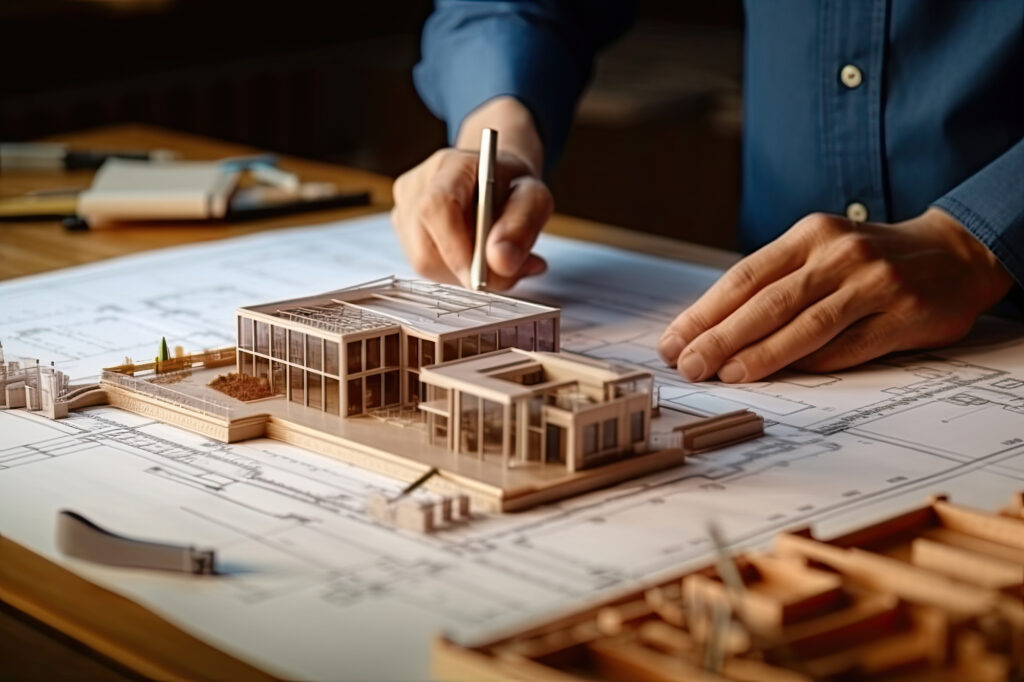Building a home is a monumental task, one that hinges significantly on the builder one chooses. It’s not just about constructing walls and installing roofs; it’s about realizing a dream and crafting a space that meets all expectations and stands the test of time. Therefore, selecting the right builder becomes a critical step in home construction.
If you don’t know where to start, below are the essential aspects to consider:

1. Understand Your Needs
Before embarking on the selection process, it’s vital to clearly understand your needs. Are you looking for a custom-built home or a production builder?
Listing down your preferences, including the number of rooms, the style of the home, and the desired neighborhood, will guide you in selecting a builder who specializes in the type of home you desire. For instance, envision a sunny kitchen space with a beautiful island or a backyard with a cozy patio space for family gatherings.
Once you have a comprehensive list, check these expectations with your family to ensure everyone’s needs are met. This step forms the foundation of your home-building journey, steering it in the right direction from the get-go.
2. Research Potential Builders
Start your research with recommendations from friends and family, and consider online reviews. Reach out to local real estate agents for insights into the reliability and quality of various builders. Exploring builders’ portfolios on their websites will help you gauge their style and craftsmanship, ensuring it aligns with your vision, especially regarding unique features such as kitchen cabinets or home decor.
3. Verify Credentials
Ensuring that a builder has the right credentials is a pivotal step in the selection process. It safeguards your investment and guarantees quality work. Here’s how to go about it:
- Confirm Licensing: Be sure your potential builders hold the necessary licenses to operate in your region. Licensing is a testament to one’s adherence to the local building codes and regulations.
- Consider The Insurance: Check if the builders have adequate insurance coverage to protect you from liabilities during the construction process. It’s a layer of security that is indispensable.
- Check Affiliations: Investigate affiliations with recognized home builder associations, indicating a commitment to high standards.
- Request References: Ask for references and take the time to contact previous clients. It can provide firsthand insight into the builder’s reliability and quality of work.
By meticulously verifying credentials, you lay a foundation of trust and quality assurance, setting the stage for a successful home construction project.
4. Inspect Past Projects
A builder’s past projects can offer a wealth of information. Take time to inspect some of the homes they’ve built. Pay attention to the quality of materials used and the workmanship—note the attention to detail in the finishing, and quality of materials used, perhaps even asking about the brands of fixtures installed, as it’s a direct reflection of what you can expect.
5. Communicate Your Vision
Once you have a list of potential builders, clearly communicate your vision to them. Discuss your preferences, the materials you envisage using, and other essential details. It will help in understanding if the builder can meet your expectations.
Sharing inspirational photos or examples can also be beneficial. It allows the builder to fully grasp your style and the functional elements you desire in your future home. This step fosters a collaborative environment where you and the builder can work harmoniously towards a common goal, bringing your dream home to fruition with a shared understanding and clear objectives.
6. Ask Questions
When meeting with potential builders, arm yourself with a list of pertinent questions. This proactive approach assures you’re well-informed and can make a decision with confidence. Some key questions to consider include:
- What is the estimated timeline for the project?
- Can they provide references from previous clients?
- How do they handle unexpected complications or delays?
- What warranties do they offer on their work and the materials used?
- How often will they update you on the project’s progress?
By seeking answers to these questions, you’ll gain a clearer understanding of the builder’s approach, ensuring a smoother construction process.
7. Get Everything In Writing
The cost to build a house is a significant investment. This is why it may be handy to get everything in writing. The good news is that a professional builder won’t hesitate to provide a detailed written agreement. It typically outlines the scope of work, the materials to be used, and the payment schedule.
A well-drafted contract can also serve as a reference point, helping to resolve any disputes that may arise during the construction process. It delineates the responsibilities of each party, ensuring that there are no gray areas that can lead to misunderstandings later on. It’s a tool that fosters transparency and trust between you and the builder.
8. Be Patient
Remember, good things take time. Be patient and allow the builder the time they need to complete the project without compromising on quality. It’s better to wait a little longer and get the home you’ve always dreamed of.
Conclusion
Building a home is more than just a construction project; it’s bringing a vision to life through a partnership founded on trust and understanding. By following the guided steps outlined above, you’re not only investing in a structure but nurturing a dream poised to stand tall for years. Make your choice with wisdom, taking into account your desires, the builder’s expertise, and the shared vision for your future home.




